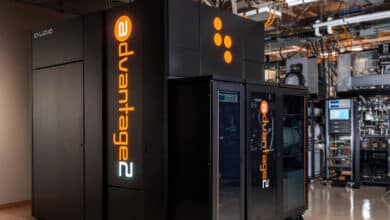Xanadu’s Photonic Quantum Computer Achieves Advantage

3 Jun 2022 – Toronto-based startup Xanadu shook the quantum world by announcing that its Borealis photonic quantum computer had achieved quantum computational advantage – completing a specialized task exponentially faster than any classical supercomputer could.
In a Nature-paper and accompanying demo, Borealis took on the Gaussian boson sampling challenge (a complex photonic calculation) and generated results in only 36 microseconds, a feat estimated to take a classical supercomputer over 9,000 years to replicate. Borealis uses particles of light (photons) passing through a programmable network of fiber loops, beam splitters, and phase shifters. It was able to handle an average of 125 photons (with peaks up to 219) in its computations, far exceeding earlier photonic experiments that used 76-113 photons. Notably, Borealis is the first photonic quantum processor to be fully programmable and to beat classical computing on a benchmark task, and it was made accessible to users via Xanadu’s cloud platform. This achievement, lauded as a “big leap forward” for the industry, put Canada on the short list of nations with devices demonstrating quantum advantage (joining U.S. and Chinese efforts).
The Borealis milestone is impactful for several reasons. It validates photonic quantum computing – an approach that operates at room temperature and leverages mature telecom components – as a viable path alongside superconducting and ion-trap technologies. For Canada, Xanadu’s result was a source of national pride, underlining the country’s research excellence. It also helped Xanadu attract major funding: shortly after, the company raised a Series C round at a $1 billion valuation and even secured a $30 million award from Canada’s Strategic Innovation Fund.
Strategically, achieving quantum advantage is more than a scientific trophy; it’s a step toward useful quantum computing. While boson sampling itself is esoteric, the techniques developed for Borealis inform the road to general-purpose quantum computers. The demonstration showed that a Canadian startup can compete at the forefront of quantum computing globally, helping to cement Toronto and Waterloo as parts of a growing “Quantum Valley”. Finally, by open-sourcing its Strawberry Fields software and offering cloud access, Xanadu also signaled an inclusive approach – inviting researchers to build on this advantage experiment and thus fostering a broader quantum software ecosystem anchored in Canada.
Quantum Upside & Quantum Risk - Handled
My company - Applied Quantum - helps governments, enterprises, and investors prepare for both the upside and the risk of quantum technologies. We deliver concise board and investor briefings; demystify quantum computing, sensing, and communications; craft national and corporate strategies to capture advantage; and turn plans into delivery. We help you mitigate the quantum risk by executing crypto‑inventory, crypto‑agility implementation, PQC migration, and broader defenses against the quantum threat. We run vendor due diligence, proof‑of‑value pilots, standards and policy alignment, workforce training, and procurement support, then oversee implementation across your organization. Contact me if you want help.



